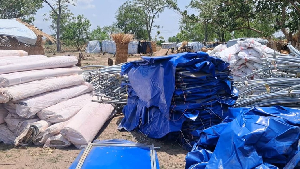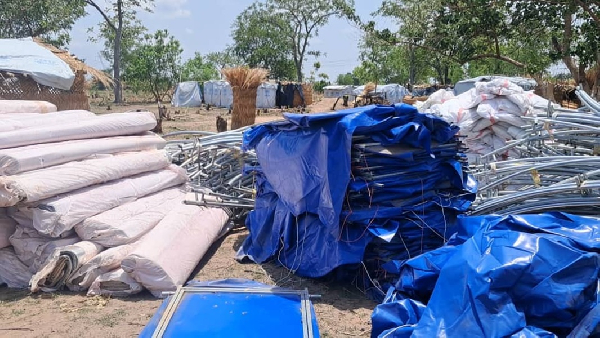 The relief items include weather-resistant tents, water treatment machines, emergency relief items
The relief items include weather-resistant tents, water treatment machines, emergency relief items
The United Nations High Commissioner for Refugees (UNHCR), in collaboration with the Ghana Refugee Board, has presented relief items worth thousands of Ghana Cedis donated by Qatar Charity Ghana to Burkinabé refugees hosted at Atta Akura in the Kintampo North Municipality of the Bono East Region.
The relief items, which included durable, weather-resistant tents, water treatment machines, solar lamps and other essential emergency relief items, were handed over to the refugees at a ceremony held on Thursday, April 10, 2025, at Atta Akura in the Bono East Region.
The donation is part of the UNHCR – Qatar Charity Ghana partnership to support refugees in Ghana. The items, particularly the weather-resistant tents, are an immediate solution for safe and secure shelter from the rainy season.
“Qatar Charity Ghana is committed to support the Government of Ghana’s development agenda by fostering strategic partnerships such as the one with UNHCR, which not only promotes the wellbeing of refugees but also impacts local communities and individuals,” said Qatar Charity Ghana’s Country Director, Hasan Owda who was present at the ceremony.
Speaking at the ceremony, the Head of UNHCR- UN Refugee Agency Ghana, Needa Jehu-Mazou, expressed her gratitude to the Mo Traditional Council for their hospitality to our Burkinabe brothers and sisters who fled to Ghana in search of safety.
“In partnership with Ghana Refugee Board, Qatar Charity Ghana and other partners, we brought some essential relief supplies with the rainy season upon us, while we jointly work to put in measures to find more permanent solutions for them. In the medium term, this partnership is geared toward ensuring self-reliance for the Burkinabe refugees and their gracious host communities,” she said.
Whilst reiterating UNHCR’s commitment to securing permanent shelter for the refugees, Needa Jehu-Mazou emphasized that strategic engagements are underway to ensure that the refugees gain access to essential social services and livelihood opportunities through Ghana’s Refugee Agribusiness Sustainable Response (GRASP) Initiative.
Acquisition of land for Agriculture as a tool for economic empowerment
As part of efforts to economically empower the refugees and support their integration into host communities, Needa Jehu-Mazou announced a significant development in the form of land acquisition for agricultural use.
She shared that, through collaboration with the Mo Traditional Council, vast acres of farmland have been secured specifically for the GRASP Initiative, an initiative designed to provide refugees with a sustainable means of livelihood by investing in their excellent farming skills and presenting a viable path toward economic stability to generate income, support their families, and reduce dependency on aid.
She added that the initiative aligns with the government’s priorities and has received support from regional administrations, including the Upper West and Bono East regional ministers. It is expected that the GRASP Initiative will bring sustainable economic growth to the refugees and their gracious host communities.
Registration of refugees
Sika Agbesi, Upper East and Bono East Regional Coordinator- Ghana Refugee Board Coordinator, noted that out of the several thousands of asylum seekers in the Bono East region, 875 have been registered, and that vigorous efforts are underway to identify and register all those who are yet to be captured.
This, he explained, is crucial for ensuring that the displaced individuals receive the appropriate assistance, protection, and access to essential services provided by the government and humanitarian partners.


